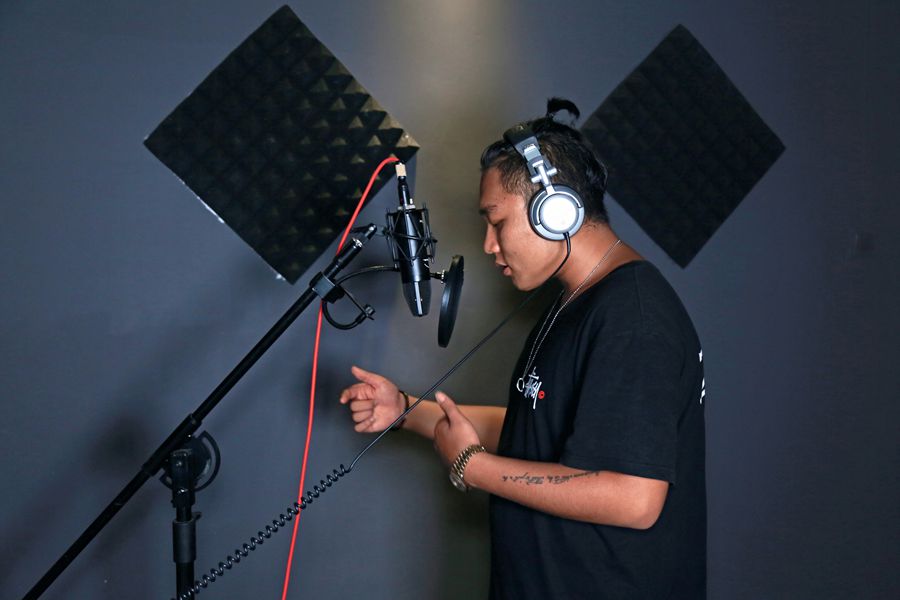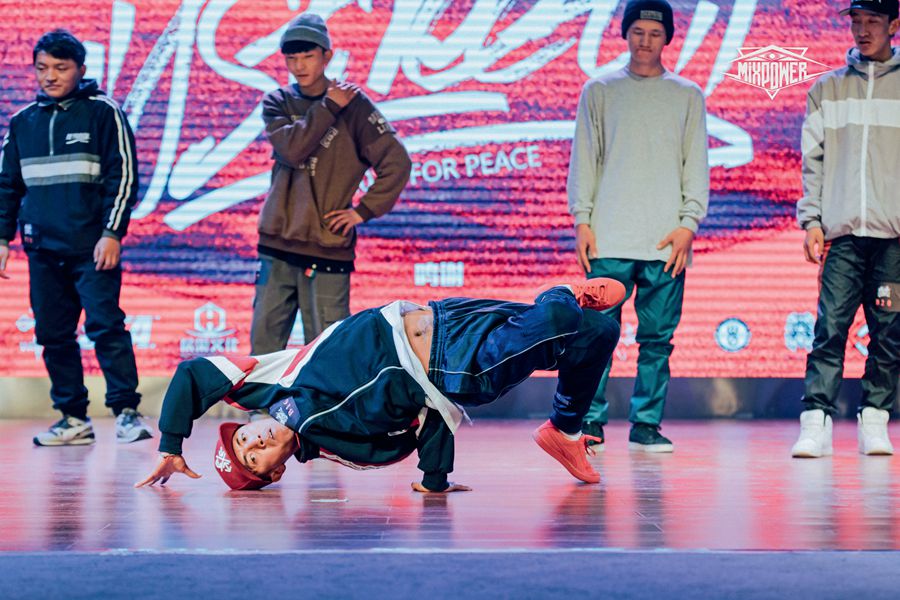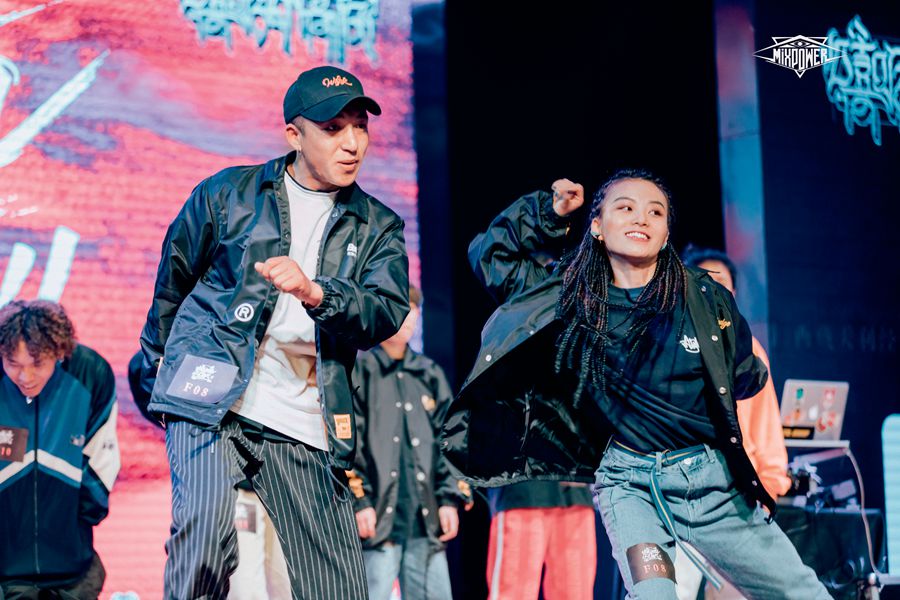TIBETAN singer Zahi Bing Zo gave a brilliant performance rapping in the Tibetan language at the second season of Sing! China, the Chinese reality talent search show, in 2017. The performance wowed the judges, one of whom was renowned Chinese pop singer Jay Chou who was mesmerized, and exclaimed that “rapping in Tibetan language is so powerful!”
Between Dreams and Reality
The word “hip-hop” originated in the late 1970s and became very popular in the early 1980s. This music genre is characterized by a rhyming speech that is chanted along melodic beats in sync with the pace of the vocal delivery. It focuses on stress, sentence structures, and flows. The Tibetan language adapts well to rapping due to the way sentences can be modulated in speech and stress in it with shifting tonal inflections.

A hip-hop singer records his new songs in a music studio.
In the daily life of monks in Tibetan monasteries, the debate on Buddhists’ understanding of religious doctrines looks like freestyle rapping to outsiders. When expressing their own ideas, the monks usually pace back and forth in open spaces or in the shade of trees, clapping hands that have prayer beads intertwined with them, and their speech is rhythmic. The scene is similar in some ways to a rap performance.
Tibetan hip-hop singers write a large proportion of songs on the local people and their folklife. Tibetan rapper Losang Jigme (stage name Mr. Jin) used to study at a college in Wuhan, central China’s Hubei Province. His song Mama Made Butter Tea was popular among other students from Tibet.
More than a decade has gone by since the birth of Tibetan hip-hop. Like many of his peers, Mr. Jin is influenced by Enimem and 2pac, two legendary American rappers. His songs went viral online recently for their catchy melodies and intelligible lyrics. Mr. Jin said that most of his inspiration comes from his own life as well as the joys and sorrows of other ordinary people.

To Mr. Jin, the biggest challenge in the past decade was consistently trying to keep a balance between his full-time job and his devotion to hip-hop in his spare time. But now, he has it figured out, realizing that hip-hop is a part of who he is.
At present, almost all local rappers in Tibet Autonomous Region (TAR) take rap mainly as a hobby. They are teachers, bank employees, police officers, or students by day, and rappers by night, entertaining and enthralling audiences in the effusive neon glow of Lhasa bars. The main reason for the lack of professional rappers lies in the instability of this profession. Though in recent years, with the growing up of generation Z in China, hip-hop audiences are mounting, it is still a niche form of entertainment in Tibet compared with traditional music.
In those Tibetan regions where locating a stable job is much more difficult, leaving few escape routes for the rappers, many have chosen hip-hop music as a lifelong pursuit in spite of uncertainties along the way.
Injecting New Vitality to Tibetan Music
The band ANU was a phenomenal success among young Tibetan singers over the past two years. One of its singles has been played a record high of over 10 million times through online music streaming services.

Hip-hop performers.
A friend of mine who travelled to Bhutan last month told me young people there also love the sound of ANU very much. Although they don’t understand the lyrics, the rhythmic music lures them to dance and strikes a chord with them. Undoubtedly, ANU enjoys a great deal of popularity among young people in the Himalayan region.
ANU means youth in Tibetan. The band was set up in 2012 by Gongba and Baya, two local young men who were both singers. They grew up together, and after graduation from senior high, they joined together again for their music dreams. The two young men studied in the Department of Music at Qinghai Normal University and were trained in an entertainment company in Beijing. In September 2014, they participated in the Taishan International Music Festival, performing on stage with famous Chinese rocker Xu Wei and a few singers from the Sing! China talent show. In December, they made it to the top 10 in a singing contest held in Lhasa.
In 2016, the two young men started their own entertainment company and their namesake fashion brand. They also released their first album with original music, which helped them rise to fame overnight. During this interview, Baya told me that he and Gongba were about to open their first clothes shop in Xining, a major city in west China’s Qinghai Province.

Performers enjoying themselves while they sing and dance on stage during a Hip-hop TV show.
Baya said that last year he and Gongba toured Tibetan areas with around 50 performances for the promotion of the album, playing to nearly packed venues, giving them huge encouragement. During this period, they refused offers to work with professional agencies with misgivings that this kind of cooperation might limit their ideas in music creation. Working on their own, however, means they have to raise money for the production of the albums by themselves. Fortunately, they found support from private sponsors and investors at last.
ANU’s music is multicultural. Tibetan rap is their forte, but they do not want to be confined within it.
Another rapper, RKZ flow Dawa, rapping for eight years, drew my attention with a rhythmic song called Sirya Hurya, which means to move forward courageously in the Xigaze dialect, his hometown’s language. Dawa loves his hometown deeply, and this year, he performed at the Losar party, a celebration of the new year festival on the lunisolar Tibetan calendar.

The ANU band enjoys a great deal of popularity among young people in the Himalayan region.
Gytha, who is still in college, is currently the most recognized female rapper. Her music describes the outside world from the female perspective, with a gentle yet powerful attitude. Many of her songs are in English. To her, being a rapper enriches her life immensely and she has gradually found her own music style, just like the former rappers did.
Speaking of the gender issue, Gytha said, “It seems that women rappers have a special appeal. We tend to be emotionally restrained, which makes us weaker in the eyes of some. But it is also our advantage as our inner strength is empowering. Besides, there are only a few female rappers out there. Everytime we rap, we are the centers of attention.”
Still a Long Way to Go
Hip hop or rap is a music genre developed by inner-city African Americans in the 1970s in New York. It swept the music circles in Europe and America at the end of the 20th century. It has surpassed rock and roll to become the most popular music genre in recent years in the U.S.

A show called The Rap of China became popular in 2017, bringing China’s rap music to the mainstream from the street culture. Rappers began to shine on TV programs. X.J.K, an influential hip-hop band in China’s mainland, describes the status of rap music as follows: pop music is a college student, rock music is a middle school student, while hip-hop is an elementary schoolchild at this point.
Few festivals are dedicated to hip-hop rap, and rappers mostly organize their shows within their own small circles. The same is true in Tibet. Rappers are all close friends and many perform for free or for internal exchanges.
The absence of professional management companies for rappers may make it a bit more bumpy for more hobbyists to make a professional career out of it. However, their love and enthusiasm keeps fueling their passion for making good music.
For the future, the singers interviewed all look forward to a day when Tibetan rap becomes a mature music industry with the help of enough investment and professional management. Rap has not yet entered the mainstream music scene in China though, as Modersky rapper Vinida said in The Rap of China show that “hip-hop can be mainstream.” Only time will tell which direction this musical odyssey is headed towards.
PINGTSO DROLMA is a freelancer.





